Developmental Psychology Assignment: Responses to Questions W3-W5
VerifiedAdded on 2022/09/09
|5
|1121
|15
Homework Assignment
AI Summary
This assignment delves into key aspects of developmental psychology, addressing concerns about a 12-year-old's moral compass, strategies for communicating healthy life choices to high school seniors, and approaches to help individuals with terminal illnesses accept the end of their lives. The student's responses analyze the roles of culture, parenting practices, and the developmental characteristics of adolescents, considering the complexities of emerging adulthood and the emotional and psychological impacts of terminal diseases. Furthermore, the assignment incorporates the concept of a 'good death' as proposed by Vogel to provide a holistic understanding of the subject matter.
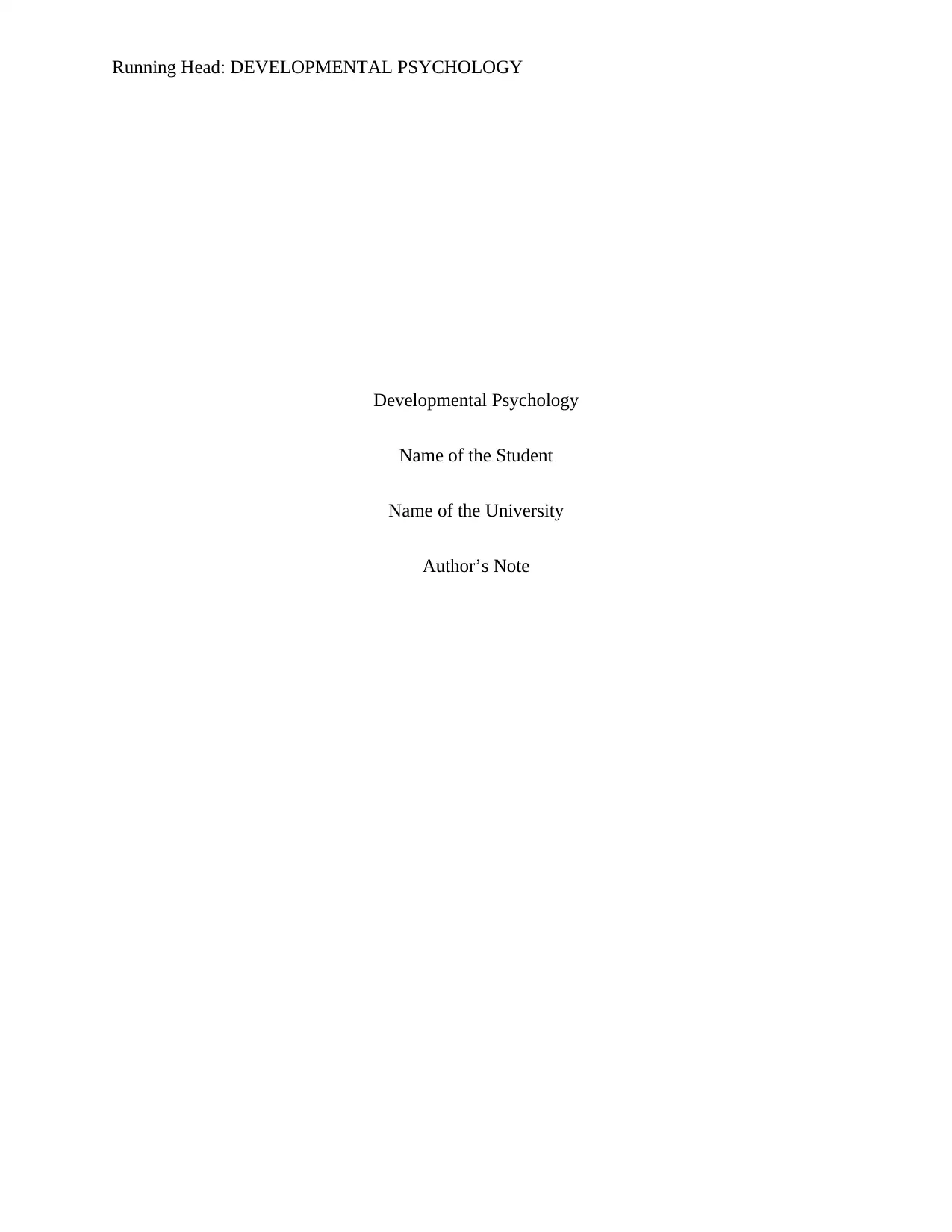
Running Head: DEVELOPMENTAL PSYCHOLOGY
Developmental Psychology
Name of the Student
Name of the University
Author’s Note
Developmental Psychology
Name of the Student
Name of the University
Author’s Note
Paraphrase This Document
Need a fresh take? Get an instant paraphrase of this document with our AI Paraphraser
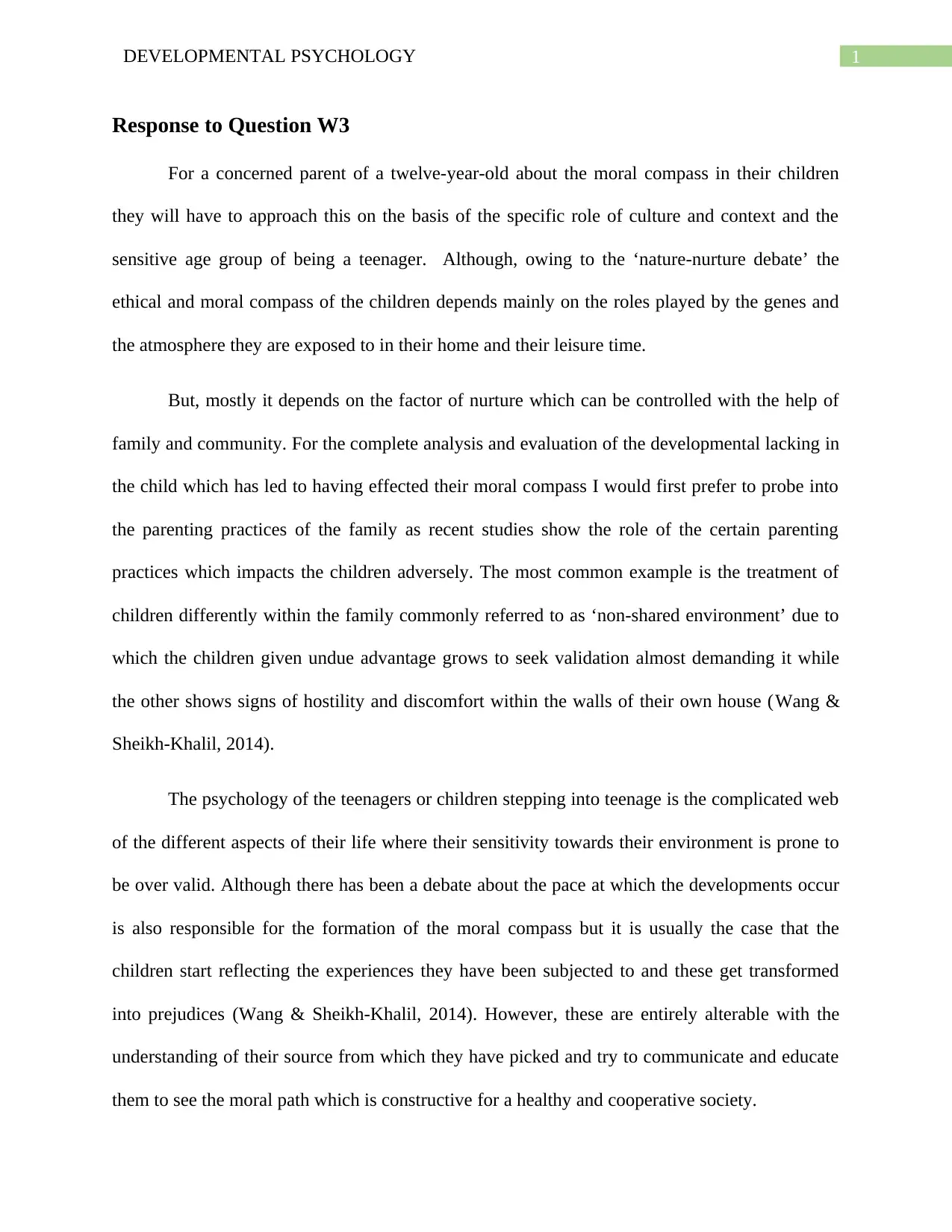
1DEVELOPMENTAL PSYCHOLOGY
Response to Question W3
For a concerned parent of a twelve-year-old about the moral compass in their children
they will have to approach this on the basis of the specific role of culture and context and the
sensitive age group of being a teenager. Although, owing to the ‘nature-nurture debate’ the
ethical and moral compass of the children depends mainly on the roles played by the genes and
the atmosphere they are exposed to in their home and their leisure time.
But, mostly it depends on the factor of nurture which can be controlled with the help of
family and community. For the complete analysis and evaluation of the developmental lacking in
the child which has led to having effected their moral compass I would first prefer to probe into
the parenting practices of the family as recent studies show the role of the certain parenting
practices which impacts the children adversely. The most common example is the treatment of
children differently within the family commonly referred to as ‘non-shared environment’ due to
which the children given undue advantage grows to seek validation almost demanding it while
the other shows signs of hostility and discomfort within the walls of their own house (Wang &
Sheikh‐Khalil, 2014).
The psychology of the teenagers or children stepping into teenage is the complicated web
of the different aspects of their life where their sensitivity towards their environment is prone to
be over valid. Although there has been a debate about the pace at which the developments occur
is also responsible for the formation of the moral compass but it is usually the case that the
children start reflecting the experiences they have been subjected to and these get transformed
into prejudices (Wang & Sheikh‐Khalil, 2014). However, these are entirely alterable with the
understanding of their source from which they have picked and try to communicate and educate
them to see the moral path which is constructive for a healthy and cooperative society.
Response to Question W3
For a concerned parent of a twelve-year-old about the moral compass in their children
they will have to approach this on the basis of the specific role of culture and context and the
sensitive age group of being a teenager. Although, owing to the ‘nature-nurture debate’ the
ethical and moral compass of the children depends mainly on the roles played by the genes and
the atmosphere they are exposed to in their home and their leisure time.
But, mostly it depends on the factor of nurture which can be controlled with the help of
family and community. For the complete analysis and evaluation of the developmental lacking in
the child which has led to having effected their moral compass I would first prefer to probe into
the parenting practices of the family as recent studies show the role of the certain parenting
practices which impacts the children adversely. The most common example is the treatment of
children differently within the family commonly referred to as ‘non-shared environment’ due to
which the children given undue advantage grows to seek validation almost demanding it while
the other shows signs of hostility and discomfort within the walls of their own house (Wang &
Sheikh‐Khalil, 2014).
The psychology of the teenagers or children stepping into teenage is the complicated web
of the different aspects of their life where their sensitivity towards their environment is prone to
be over valid. Although there has been a debate about the pace at which the developments occur
is also responsible for the formation of the moral compass but it is usually the case that the
children start reflecting the experiences they have been subjected to and these get transformed
into prejudices (Wang & Sheikh‐Khalil, 2014). However, these are entirely alterable with the
understanding of their source from which they have picked and try to communicate and educate
them to see the moral path which is constructive for a healthy and cooperative society.
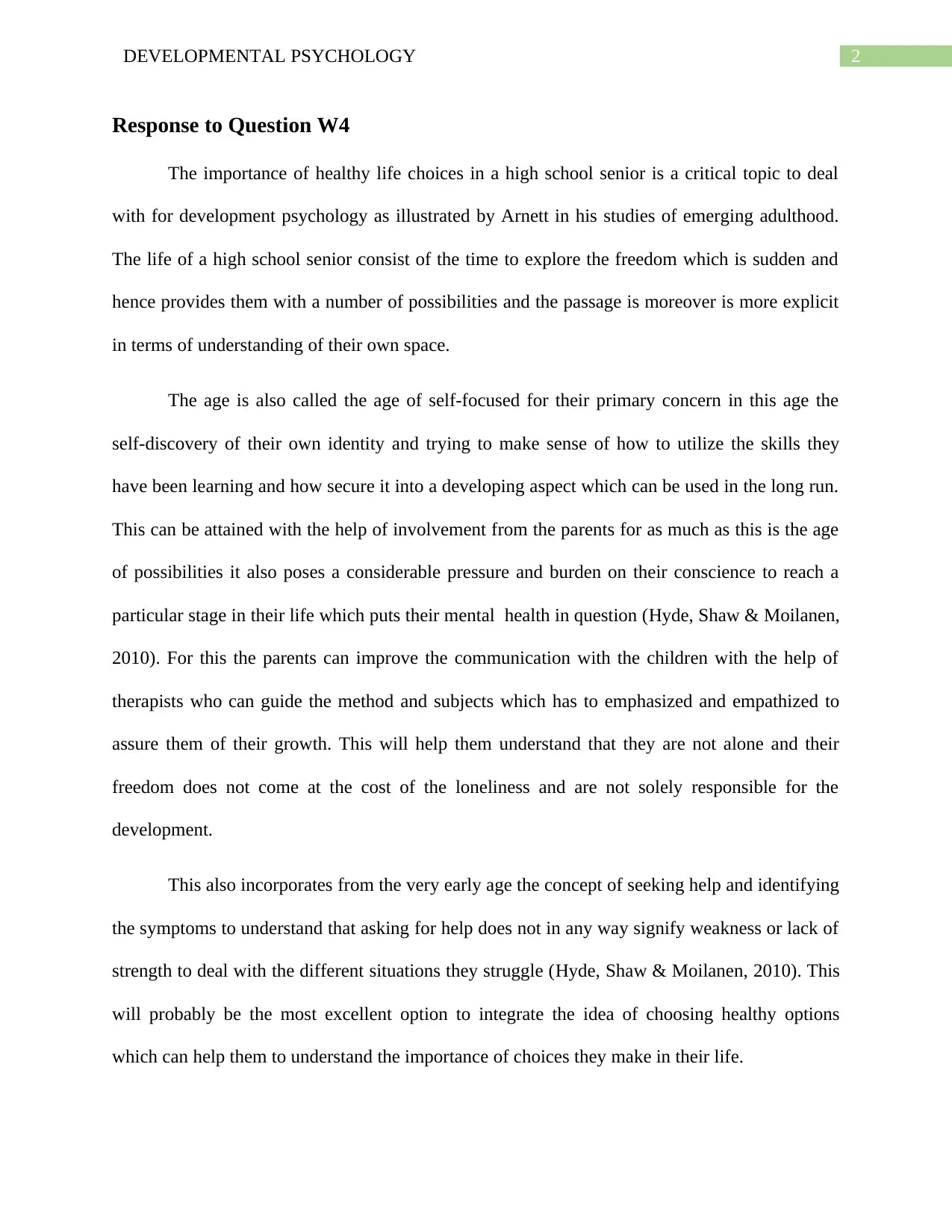
2DEVELOPMENTAL PSYCHOLOGY
Response to Question W4
The importance of healthy life choices in a high school senior is a critical topic to deal
with for development psychology as illustrated by Arnett in his studies of emerging adulthood.
The life of a high school senior consist of the time to explore the freedom which is sudden and
hence provides them with a number of possibilities and the passage is moreover is more explicit
in terms of understanding of their own space.
The age is also called the age of self-focused for their primary concern in this age the
self-discovery of their own identity and trying to make sense of how to utilize the skills they
have been learning and how secure it into a developing aspect which can be used in the long run.
This can be attained with the help of involvement from the parents for as much as this is the age
of possibilities it also poses a considerable pressure and burden on their conscience to reach a
particular stage in their life which puts their mental health in question (Hyde, Shaw & Moilanen,
2010). For this the parents can improve the communication with the children with the help of
therapists who can guide the method and subjects which has to emphasized and empathized to
assure them of their growth. This will help them understand that they are not alone and their
freedom does not come at the cost of the loneliness and are not solely responsible for the
development.
This also incorporates from the very early age the concept of seeking help and identifying
the symptoms to understand that asking for help does not in any way signify weakness or lack of
strength to deal with the different situations they struggle (Hyde, Shaw & Moilanen, 2010). This
will probably be the most excellent option to integrate the idea of choosing healthy options
which can help them to understand the importance of choices they make in their life.
Response to Question W4
The importance of healthy life choices in a high school senior is a critical topic to deal
with for development psychology as illustrated by Arnett in his studies of emerging adulthood.
The life of a high school senior consist of the time to explore the freedom which is sudden and
hence provides them with a number of possibilities and the passage is moreover is more explicit
in terms of understanding of their own space.
The age is also called the age of self-focused for their primary concern in this age the
self-discovery of their own identity and trying to make sense of how to utilize the skills they
have been learning and how secure it into a developing aspect which can be used in the long run.
This can be attained with the help of involvement from the parents for as much as this is the age
of possibilities it also poses a considerable pressure and burden on their conscience to reach a
particular stage in their life which puts their mental health in question (Hyde, Shaw & Moilanen,
2010). For this the parents can improve the communication with the children with the help of
therapists who can guide the method and subjects which has to emphasized and empathized to
assure them of their growth. This will help them understand that they are not alone and their
freedom does not come at the cost of the loneliness and are not solely responsible for the
development.
This also incorporates from the very early age the concept of seeking help and identifying
the symptoms to understand that asking for help does not in any way signify weakness or lack of
strength to deal with the different situations they struggle (Hyde, Shaw & Moilanen, 2010). This
will probably be the most excellent option to integrate the idea of choosing healthy options
which can help them to understand the importance of choices they make in their life.
⊘ This is a preview!⊘
Do you want full access?
Subscribe today to unlock all pages.

Trusted by 1+ million students worldwide
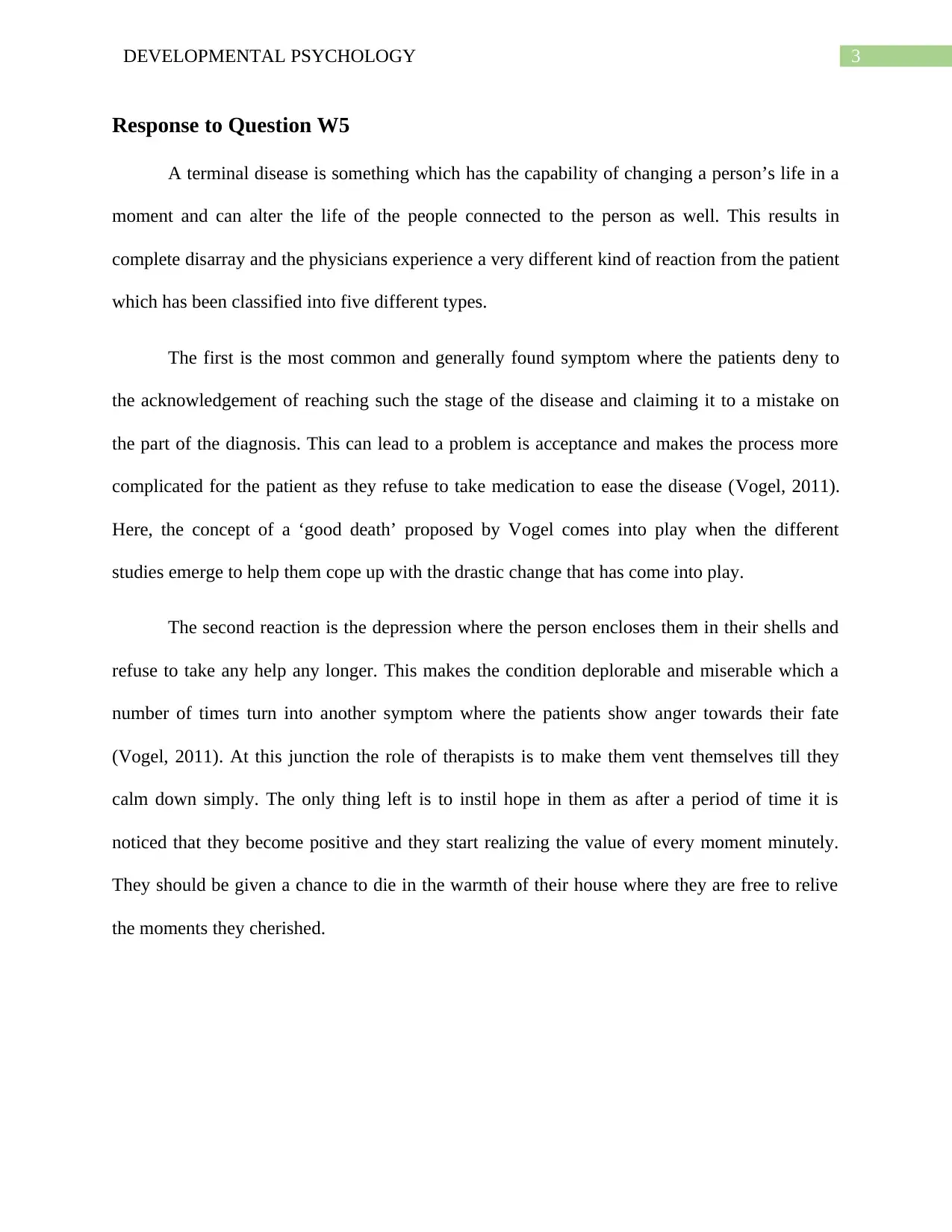
3DEVELOPMENTAL PSYCHOLOGY
Response to Question W5
A terminal disease is something which has the capability of changing a person’s life in a
moment and can alter the life of the people connected to the person as well. This results in
complete disarray and the physicians experience a very different kind of reaction from the patient
which has been classified into five different types.
The first is the most common and generally found symptom where the patients deny to
the acknowledgement of reaching such the stage of the disease and claiming it to a mistake on
the part of the diagnosis. This can lead to a problem is acceptance and makes the process more
complicated for the patient as they refuse to take medication to ease the disease (Vogel, 2011).
Here, the concept of a ‘good death’ proposed by Vogel comes into play when the different
studies emerge to help them cope up with the drastic change that has come into play.
The second reaction is the depression where the person encloses them in their shells and
refuse to take any help any longer. This makes the condition deplorable and miserable which a
number of times turn into another symptom where the patients show anger towards their fate
(Vogel, 2011). At this junction the role of therapists is to make them vent themselves till they
calm down simply. The only thing left is to instil hope in them as after a period of time it is
noticed that they become positive and they start realizing the value of every moment minutely.
They should be given a chance to die in the warmth of their house where they are free to relive
the moments they cherished.
Response to Question W5
A terminal disease is something which has the capability of changing a person’s life in a
moment and can alter the life of the people connected to the person as well. This results in
complete disarray and the physicians experience a very different kind of reaction from the patient
which has been classified into five different types.
The first is the most common and generally found symptom where the patients deny to
the acknowledgement of reaching such the stage of the disease and claiming it to a mistake on
the part of the diagnosis. This can lead to a problem is acceptance and makes the process more
complicated for the patient as they refuse to take medication to ease the disease (Vogel, 2011).
Here, the concept of a ‘good death’ proposed by Vogel comes into play when the different
studies emerge to help them cope up with the drastic change that has come into play.
The second reaction is the depression where the person encloses them in their shells and
refuse to take any help any longer. This makes the condition deplorable and miserable which a
number of times turn into another symptom where the patients show anger towards their fate
(Vogel, 2011). At this junction the role of therapists is to make them vent themselves till they
calm down simply. The only thing left is to instil hope in them as after a period of time it is
noticed that they become positive and they start realizing the value of every moment minutely.
They should be given a chance to die in the warmth of their house where they are free to relive
the moments they cherished.
Paraphrase This Document
Need a fresh take? Get an instant paraphrase of this document with our AI Paraphraser
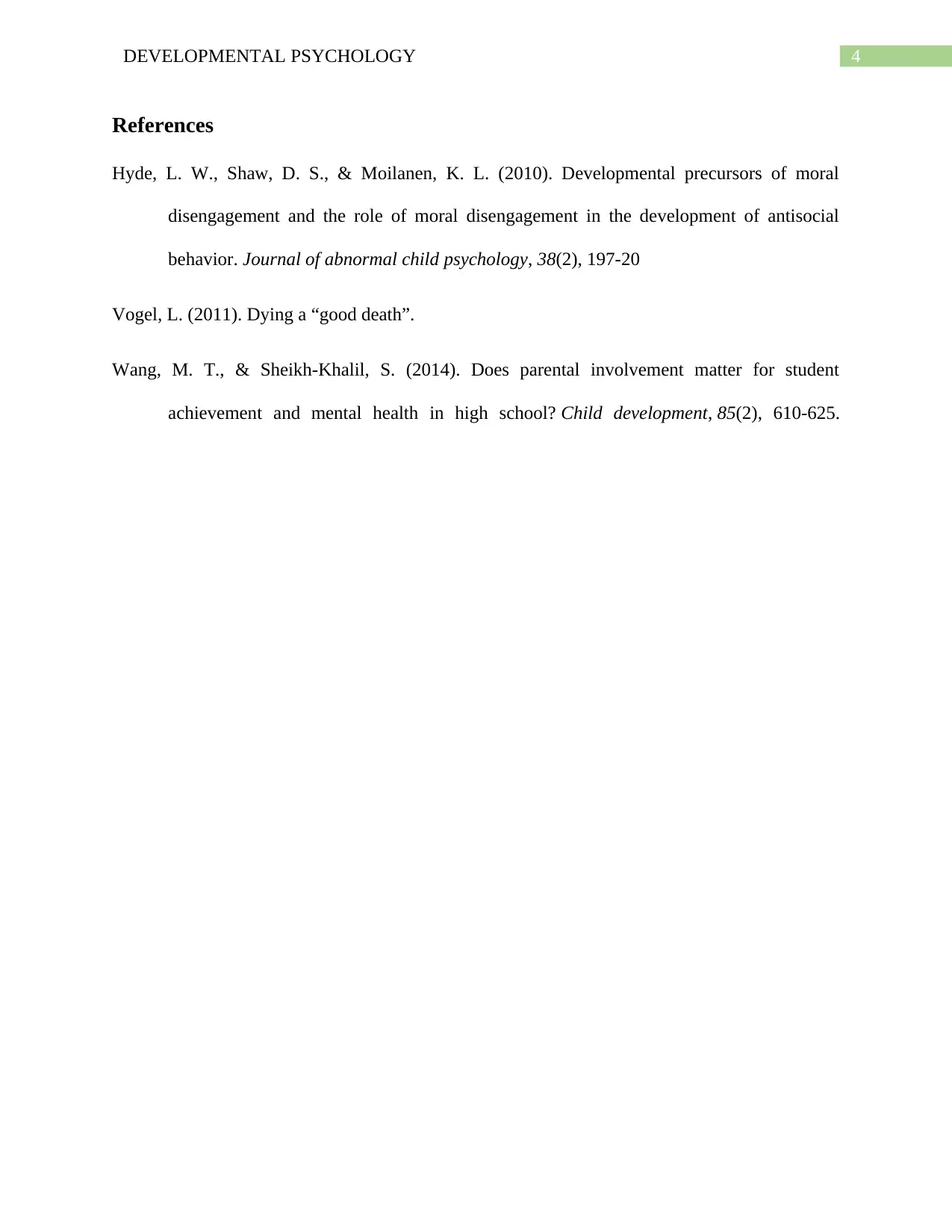
4DEVELOPMENTAL PSYCHOLOGY
References
Hyde, L. W., Shaw, D. S., & Moilanen, K. L. (2010). Developmental precursors of moral
disengagement and the role of moral disengagement in the development of antisocial
behavior. Journal of abnormal child psychology, 38(2), 197-20
Vogel, L. (2011). Dying a “good death”.
Wang, M. T., & Sheikh‐Khalil, S. (2014). Does parental involvement matter for student
achievement and mental health in high school? Child development, 85(2), 610-625.
References
Hyde, L. W., Shaw, D. S., & Moilanen, K. L. (2010). Developmental precursors of moral
disengagement and the role of moral disengagement in the development of antisocial
behavior. Journal of abnormal child psychology, 38(2), 197-20
Vogel, L. (2011). Dying a “good death”.
Wang, M. T., & Sheikh‐Khalil, S. (2014). Does parental involvement matter for student
achievement and mental health in high school? Child development, 85(2), 610-625.
1 out of 5
Related Documents
Your All-in-One AI-Powered Toolkit for Academic Success.
+13062052269
info@desklib.com
Available 24*7 on WhatsApp / Email
![[object Object]](/_next/static/media/star-bottom.7253800d.svg)
Unlock your academic potential
Copyright © 2020–2026 A2Z Services. All Rights Reserved. Developed and managed by ZUCOL.





